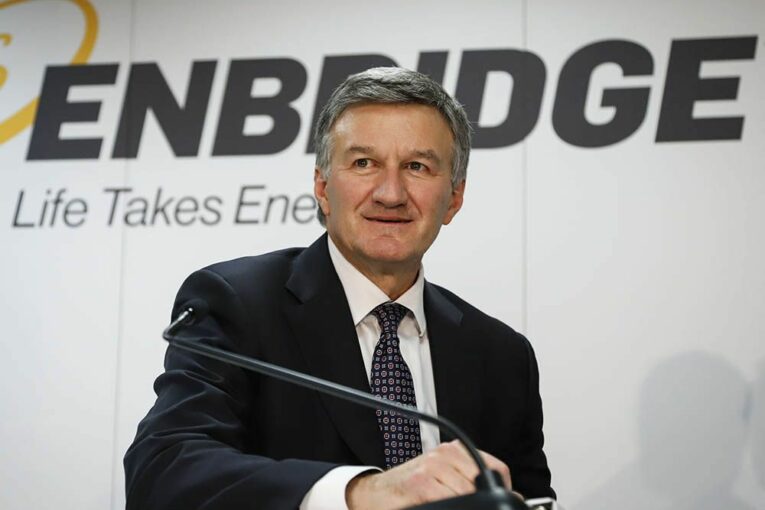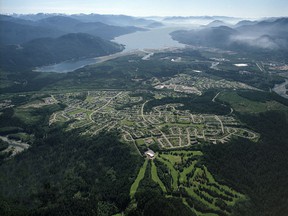
The world has moved into an energy crisis, additional supplies are required and a window has opened to build new liquefied natural gas developments, says Enbridge CEO Al Monaco.
In such turbulence, Canada can play an “outsized role” in the future of global energy, although regulatory challenges need to be removed so the country can provide low-carbon, secure and affordable energy to the world.
These were some of the key messages the head of Canada’s largest pipeline company delivered Wednesday during an address about the future of energy to the Canadian Club of Toronto.
“We have just crossed a major inflection point in energy markets and we are, for sure, in an energy crisis,” Monaco told the audience.
“The bottom line is the time has come to take a fresh look at Canada’s role in the global energy transition. The responsibility, and the opportunity, is (here) today — and we simply need to get after it.”
Global energy prices have skyrocketed this year following the invasion of Ukraine by Russia, the world’s largest oil and gas exporter.
Energy demand has rebounded from early pandemic lows, although underinvestment in oil and natural gas production continues. A commitment by the European Union to shift off of Russian fossil fuels by 2027 has added to an already complicated picture.
On Wednesday, West Texas Intermediate crude prices closed at $107.04 a barrel, while benchmark U.S. natural gas ended the day at US$8.37 per million British thermal units, up more than 120 per cent since the beginning of January.
As consuming nations in Europe and Asia are looking for more supplies, the Trudeau government has pledged Canada will produce an additional 300,000 barrels of oil equivalent by the end of the year.
The federal government has also been discussing with European countries what role Canada, the world’s fifth-largest natural gas producer, can play to provide LNG in the future.
Western Canada has massive natural gas reserves in the Montney formation and more than a dozen LNG developments have been proposed over the past decade for the British Columbia coast. Only the Shell-led LNG Canada megaproject is under construction.
Down south, the U.S. is set to become the largest LNG exporter in the world this year, while other countries such as Qatar have aggressive expansion plans.
“Canada missed the first LNG window,” Monaco told the audience. “We are behind, no doubt about that. But we can catch up, that’s the good news.”

With security of supply concerns rising, the head of Enbridge said the world will need more energy than previously thought to act as a type of “supply buffer,” while greater diversification of supply sources will also be required.
Canada could fill some of this gap. However, the ability to attract investment will be essential if major energy projects are to move ahead.
That requires some degree of regulatory certainty.
Enbridge, which operates on both sides of the border, already supplies four American LNG plants with about two billion cubic feet (bcf) of natural gas per day.
Monaco noted that Canadian energy can offer “the whole package” with a large resource base, low operating costs, a focus on reducing emissions and a commitment to building relationships with Indigenous communities.
But the prolonged length of time to get a project moving is daunting.
Costs to get through the regulatory process can top hundreds of millions of dollars — and it can still be turned down, as Enbridge saw with its Northern Gateway pipeline proposal in 2016.
“The problem right now is timing, of getting from initial concept to regulatory approval and then, finally, cabinet approval,” Monaco said in an interview.
“That is an uncertain timeline. And we need to get our heads around the timing of this in order for capital to be invested.”
-

Varcoe: ATCO boss tackles future of hydrogen, Alberta victory over Ottawa and own missteps
-

Varcoe: ‘Canadian LNG is a jewel’ says Enbridge CEO as sector anticipating new projects to take off
Greenfield LNG projects typically take four to seven years to develop, including the permitting process, consulting with communities and constructing the development, said LNG expert Geoffrey Cann, a principal at MadCann Alberta.
“If Canada wants to compete, we have to get moving, and our country is chronically unable now to mobilize very large energy infrastructure projects,” Cann said.
“I do not believe we will see an LNG boom in Canada. I’m not optimistic.”
Federal Natural Resources Minister Jonathan Wilkinson said Canada has established a working group with Germany and the EU to explore the potential of LNG from this country helping meet the demand.
The federal government is also speaking with proponents of LNG developments that could potentially supply gas to Europe from the Atlantic coast, including Pieridae Energy’s Goldboro project and an initiative in New Brunswick involving Repsol.
“We are talking to them about what would be required for them to actually be able to make those investments,” Wilkinson said in an interview this week.
Pieridae Energy CEO Alfred Sorensen said Wednesday the company’s LNG project, which was put on hold last June, still needs to see all transportation issues resolved so western Canadian natural gas could be shipped to Nova Scotia.
“There is definitely a change in the air and whether that lasts for very long, who knows? But there’s no doubt the government is very focused right now to get something done — and to be seen to be being helpful in getting new supply into the European Union,” Sorensen said.
“I’m quite optimistic.”
So is Monaco.
“There are a lot of checkmarks for our industry to serve global markets,” he said.
“This is the time to do it.”
Chris Varcoe is a Calgary Herald columnist.
You can read more of the news on source
